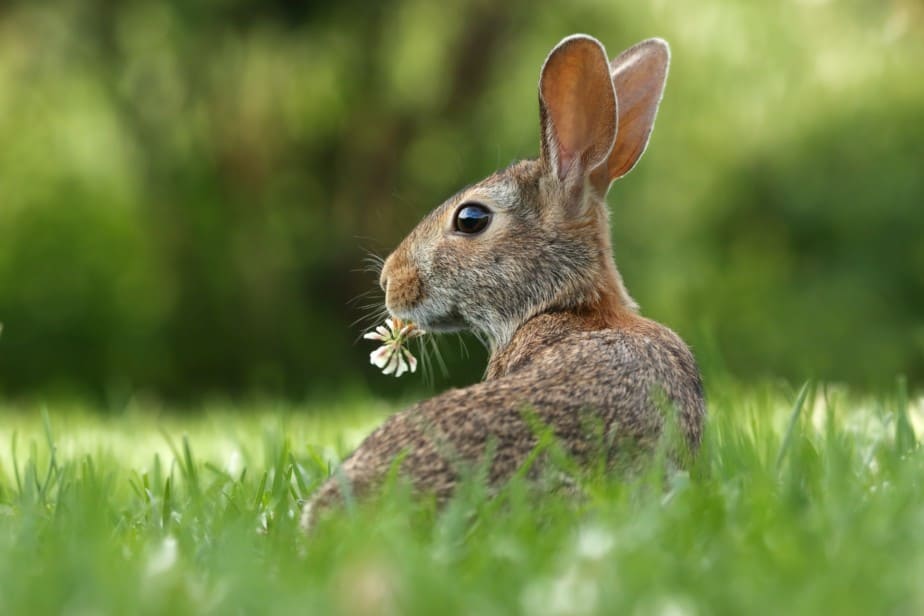If you’re having problems with rabbits destroying your garden, there are a number of solutions you can explore to keep them out. In today’s post we’ll explore some of the common approaches, and in this post I’ll walk through how you can incorporate them into an overall garden design.
So, what are the best ways to keep rabbits out of your garden?
The most effective approach to keeping rabbits out of your yard is to physically block them from reaching your garden completely. You can fence off an entire area, a specific garden bed, individual plants or trees, or even raise vulnerable plants out of reach.
You should also try to remove cover rabbits can hide in from around your garden area, and consider breaking up planting rows into smaller sections to disrupt their feeding habits.
Another approach is to spread “evidence” of predators around the yard. This could be:
- Placing fur or hair around your garden
- Letting pets roam and mark territory
- Buying specialised products to deter rabbits like fox urine or dried blood
- Place used cat litter, or dog or cat poo around the garden
- Use ferret faeces in specific spots
- Encourage local predators to monitor your area – owls or raptors
Alternatively, you can try using specific plants to deter them, or test a few small, low cost methods to see what works best for you. These methods aren’t consistently effectively, but may worth exploring. They include:
- Spreading coffee grinds around the garden
- Using “scarecrows” or ultrasonic sound repellers
- Odorous fertilisers
- Homemade sprays – vinegar, chili or garlic
- Clip-on repellents
Keeping rabbits from eating your plants is not an exact science. You may need to try a few different methods to see what works on your local rabbit species and populations. Before we touch on some of these methods, let’s have a quick look at how to tell if rabbits are, indeed, in your garden.
Signs Rabbits Are In Your Garden
Rabbits prefer tender new leaves and shoots, but if hungry enough will eat anything – even things they’d normally avoid. This is why physical barriers work better better than plants that deter rabbits – they can still eat plants if needed, unlike fences or walls.
You can tell rabbits have been in your garden if:
- Young shoots or leaves have been gnawed or disappear completely
- The cut is clean and straight – like it’s been trimmed or cut with scissors
- You find signs of digging or fur caught on things
- Plants are only eaten or gnawed up to about knee height – they only eat what they can fairly easily reach
If you find holes or partially eaten leaves, you might have slugs or caterpillars. Or if things have been munched on at a higher level – greater than 2 or 3 ft – you might be dealing with deer, squirrels, possums or other animals, depending on where you live.
Keep Rabbits Out Of Your Garden Using A Physical Barrier
The best way to keep rabbits out of your yard is to create a physical barrier like a fence. You can opt for heavier materials like brick, stone or timber, but even a wire or mesh fence will work – you just need to build them correctly.
Firstly you want any fence you create to be at least 3 ft high. Some rabbits can jump higher, but it’s unusual – 3 ft should be the minimum.
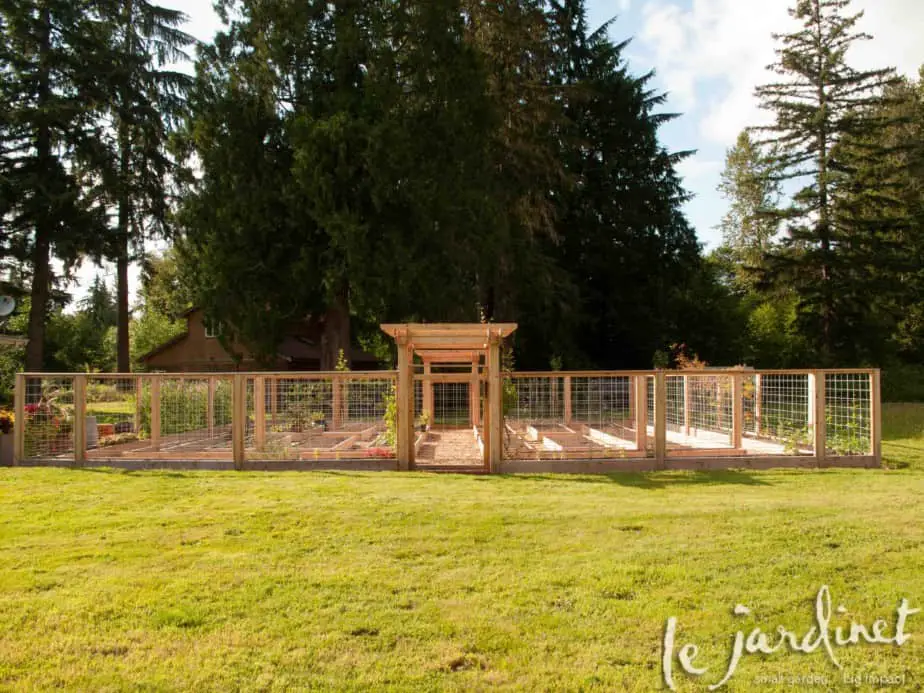
Image from lejardinetdesigns.com
Secondly, if you are using wire or mesh, ensure it has gaps no larger than 1/2 an inch square. Larger gaps may be big enough for a rabbit to squeeze through.
Thirdly, you want to dig down about half to 1 ft below ground and have the wire buried this deep. This should prevent rabbits digging under the fence.

Image from pinterest
Alternatively, you can run the wire/mesh along ground level away from the base of the fence for a foot or so. Peg it down to prevent it moving, or bury it slightly beneath the surface.
If you’re feeling up to it you can dig deep and flare the bottom mesh out away from the fence as well. You can add another layer of mesh or weed mat below ground level to make it even harder for rabbits to break through.
If you are building a brick or stone fence, when you place footings, try to ensure they go deep enough to prevent any tunnelling. And if you want a timber fence, again, ensure you have wire/mesh/weed mat below ground and/or away from the base of the fence to prevent digging.
Prevent Rabbit Damage To Plants By Individually Protecting Them
If fencing off a whole area of your yard is not something you want to do, you may want to protect specific sections of your garden instead.
You can fence of a particular garden bed, or space within a garden bed, or perhaps individual plants. You can see in these images from motherearthnews.com a neat little wire triangular canopy over a row of lettuce to keep the rabbits away.
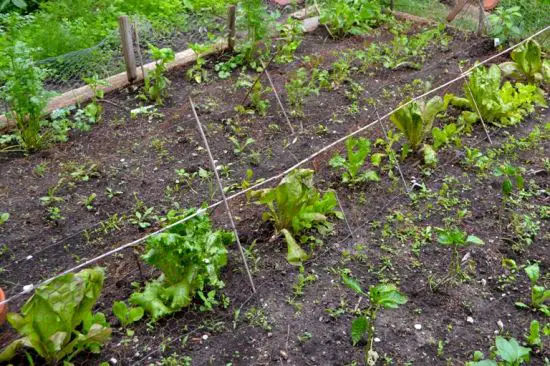
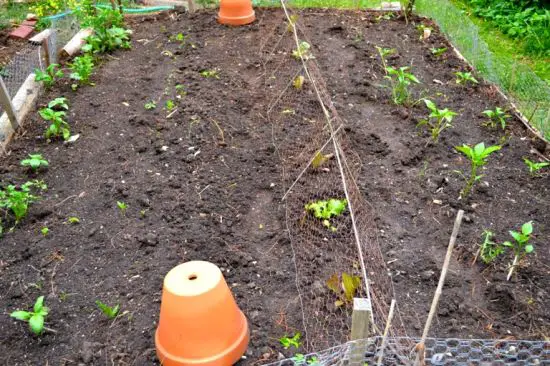
Images from motherearthnews.com
Another option for trees or shrubs – to protect their young bark – is a tree guard. Buy one or create one yourself by placing stakes around the tree and winding mesh/wire around it. Be sure they also go along the surface or beneath the ground.
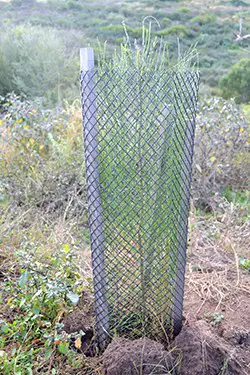
Keep Vulnerable Plants Out Of Reach Of Rabbits
Rabbits tend to eat what they can reach. Even if they are able to jump a fence into a garden, they aren’t necessarily able to reach much beyond two feet off the ground.
Raised garden beds are a good way to keep soft, tender plants out of reach. The higher the better. Be careful to provide multiple layers of mesh and protective cloth within the raised bed, so they can’t tunnel their way up!
Another approach is to have a specific working table where you prepare and keep young plants before planting them. Like preparing seedlings and propagating, you can have a secure space for young, vulnerable plants.
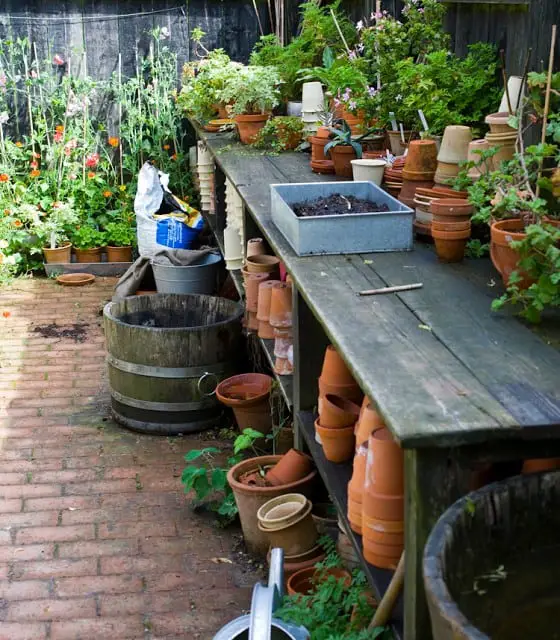
Image from pinterest
Once they’ve reached a specific size and may be less likely to suffer rabbit damage, you can look to transplant them where you want to.
Take Away Cover So Rabbits Can’t Hide Near Your Plants
Rabbits are much more wary of eating plants if they have no nearby cover to hide in. Clearing away any possible hiding places from near your garden beds reduces the likelihood they’ll venture close to your garden. This includes rocks, taller grasses, nearby shrubs, low decks or porches.
Without cover to run to for protection, rabbits will be less willing to spend a lot of time out in the open. The only thing to be aware of when removing cover is to consider other animals that may also use those spaces for cover, or as their home. This is especially important if rabbits are a pest in your area, like Australia.
Plant In Short Rows To Reduce Safe Eating “Lines” For Rabbits
A good trick with hares (and most likely some species of rabbits) is to keep your planting rows short and stagger them. Like the above tip – reducing cover around your garden – it can help to reduce perceived cover within it.
Hares and rabbits tend to graze in a line – along crops, trees or fence lines – when they know they’re in a relatively safe area, or have access to one nearby.
Breaking your ‘lines’ up or leaving gaps between sections can discourage them from eating along the whole row of plants. By interrupting their preferred feeding habits, you increase their need to stay close to cover. Every additional “scramble” through an open area is a risk they may want to avoid.
7 Signs Of A Predator To Scare Rabbits Away
Another way to deter rabbits is to imitate predator smells, sights or behaviour. You can do this by:
- Encouraging family pets to explore and leave scents and fur around the garden
- Placing animal fur (ask local dog groomers for a few bags) around your garden – or, use human hair
- Place used cat litter or dog poo in some places around or through the garden – lightly cover or hide them to let them last a little longer
- Ferret faeces is another option – they are natural predators to rabbits and may be more effective than cats or dogs
- You could also sprinkle dried blood (apparently available from some garden centres) around the place to suggest a predators feeding ground
- Relatedly, you may actually want to attract predators like raptors or owls and let them scare rabbits away – again, beware if you have pets
- Another option is fox urine – some garden centres sell fox urine that you can soak a cloth or cotton balls in
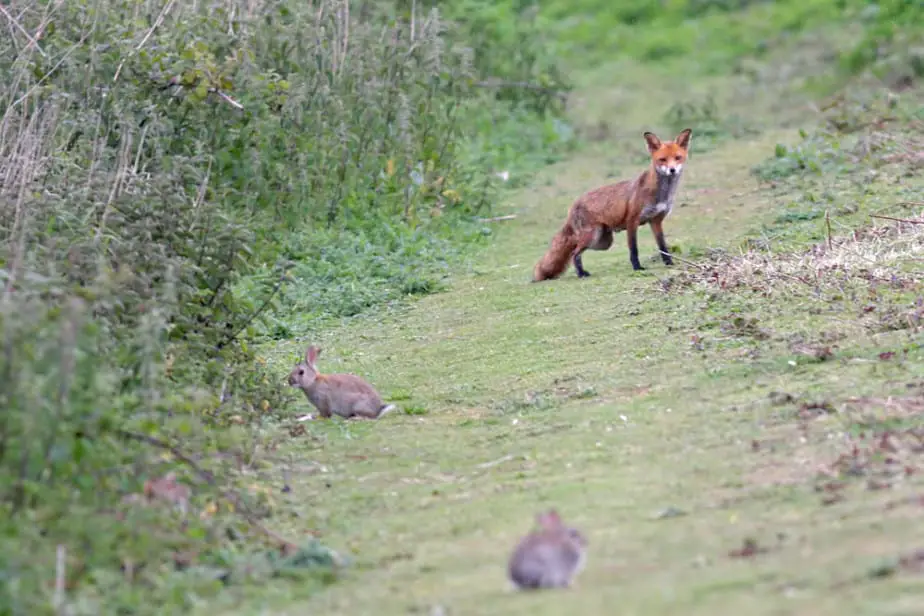
Image from mentalscoop.com
These kinds of markings or should deter rabbits in some way. The downside is they are temporary and may need to be replaced periodically as they’ll wear off due to rain, or over time. Not a fun job if you don’t have pets.
Use Plants That Are Likely To Deter Rabbits
Although there are some plants rabbits will avoid, I’ve been unable to find an option that consistently works well. If rabbits are hungry enough, they will try to eat anything, so relying on plants as a major barrier to your precious harvest is unlikely to work for a long period of time.
That said, some commonly mentioned plants that may deter rabbits include Hawthorn, Holly, Juniper, Marigolds, Wax Begonia, Snapdragons, Catnip, Potatoes, Shirley Poppy, Sweet Alyssum, Ageratum, Globe Thistle and various herbs such as Rosemary, Sage, Oregano, Basil and Chives.

Many of these plants have one or more of the key features you want to look for in a rabbit-resistant plant. These plants or flowers have spines, a fuzzy texture, strong odour, leathery leaves or ooze a milky sap. Speak to a local expert to find some that tick one or more of these boxes, and try planting them in different areas around your yard to see what works.
7 Low Cost Methods To Keep Rabbits Out Of Your Yard
Below is a table of smaller, more cost effective options that may work alongside some options above. As I said, different rabbits cause different issues, and respond differently to different things, so you might need to explore a few to what works best.
Low Cost Ways To Keep Rabbits Out Of Your Garden
| TACTIC | EFFECTIVENESS |
| Spread Coffee Grinds | Mixed – may deter rabbits for a time, but can wash away and cause issues with soil |
| Use Scarecrows Or Decoys | You can find a number of scarecrow like products that claim to deter rabbits. Some are even solar powered motion detectors. These tend to work well at first, but rabbits sometimes learn they’re not a threat and ignore them. |
| Use Ultrasonic Sound Repellers | Similar to the scarecrow idea but it’s a tool that produces ultrasonic sounds and flashes to scare animals. Again, this could work quite well, but have been shown to lose effectiveness over time as rabbits learn not to fear them. |
| Use Fertiliser Repellants | Something bloody – like blood meal or bone meal – can act as quite good deterrents. They also break down and help your garden in the process. You’ll need to top them up every few weeks, and the smell may be something you also find annoying. |
| Spray Homemade Deterrent | Vinegar, garlic or chili/habanero sprays are shown to work quite well at deterring many animals. The issue is you need to respray fairly regularly (every few days) as they wash away after rain – or if you have sprinklers. |
| Soak or Spread Something With A Homemade Deterrent | A good tip is to soak something like an old corn cob in vinegar and/or chili and stick them around the garden. You can try a similar thing by spreading ‘chili wax’ around. Soak or re-wax them every few weeks. |
| Clip On Garlic Odour Repellents | You can purchase little clips that can be pegged at the base of a plant or stake, often containing a strong smell like garlic. These are likely to stick around longer than sprays, but like other approaches, rabbits may learn to ignore it. |
OR – Distract Rabbits From Your Garden By Providing An Alternative
Finally, a popular option is to provide an alternative food source that rabbits prefer to eat. Clover is a common choice gardeners place in another location in their yard to satisfy their local rabbits.

This approach sounds nice in theory, but reports suggests some rabbits won’t settle just for clover, and can continue to explore your yard to find food.
Still, if you have the space or inclination, and protect your garden in ways listed above, you can create a little rabbit feeding spot to distract them from the stuff you actually want to eat and/or grow.
So that’s it for our look at how to keep rabbits out of your garden. Have you tried any yourself? What works for your area, and what doesn’t? if you want to try and implement some of these approaches into your own garden, do check out my post on how to design a garden to accommodate some of the tips listed above.

